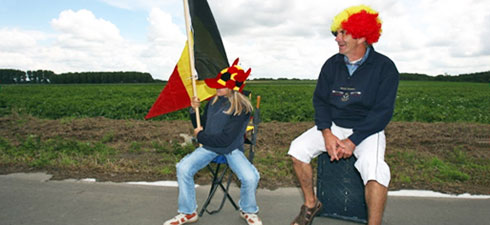I’ve always found the Belgians’ lack of national pride rather refreshing. It knocks me out to see Americans place their hand over their heart to belt out the Star-Spangled Banner. I regard zealous Dutch Orangists [i.e. monarchists] with a mix of amazement and some compassion. And not too long ago in the Balkans we saw what fatal consequences an overblown consciousness of ethnic identity can have.
We Belgians are not like that. No civil wars, no hysteria, no sentimentalism. We accept our muddled makeup with a shrug. Three languages? So what? That’s our identity. Three hundred brands of beer? There you go: that’s our identity. There’s no denying that our hypothetical identity is utterly artificial. But in this respect it is no different from plenty of other European identities. So what exactly sets it apart from the others? What should we make of this motley crew of nationals of the mishmash called Belgium?
Our peaceful language clash
I think we Belgians had better delete the singular form of the word identity from our vocabulary. In the first place, we belong to our local municipalities. We are incorrigible particularists. We hail from Ghent or Turnhout or Charleroi and from nowhere else, and we like to make it known loud and clear.
In the second place, the history of our peaceful language clash has made us either Flemings or Walloons. Even smaller identity fragments exist, to be sure, but I’ll confine myself to the main strands. These Flemish and Walloon identities are artificial constructs too. They were simply non-existent before 1830 [year of Belgian independence]. The Fleming, in his relation to the world, is a by-product of Belgium, hence doubly artificial. The Walloon, for his part, is a by-product of the Flemish by-product. Are these potent identities? Hardly. We snog a-plenty across the language divide. In other countries you pay for suchlike fornication with your life, or at best an atrocious mutilation.
Hundreds of thousands moving every which way
And then there’s Belgium: we are, after all, Belgians too. And then there’s Europe. If I may cite an apposite literary reference, the great French-Lebanese writer Amin Maalouf says we are the sum of various roots, identifications, community memberships, to use his terms. So why should there be a single identity that eclipses all the others? Such exclusive identities readily morph into murderous identities – which happens to be the title of one of his best essays.
Embracing Maalouf’s conception is an absolute must for the 21st century. Virtually all across the surface of our planet, hundreds of thousands of people are moving every which way, and it doesn’t look as though that’s going to change any time soon. Now more than ever before, identities are intermingled, they clash, they kiss, they kill. They kill as well, massively.
Give the French some advice
In fact, we ought to know how to handle all that confusion, here in Belgium, as it has been our constant companion for as long as our country exists. Our secret is not so much that we Belgians don’t have a bona fide identity. On the contrary, we Belgians have too many identities. Too many choices. But why should that be a problem? Why hem ourselves in by forcing ourselves to make choices that are unnecessary, and even harmful? And all at once, the threat of the Other disappears too: he has been a part of ourselves for a long time. Another writer, and a good one at that, Fernando Pessoa, knew all too well: “Na vasta colónia do nosso ser há gente de muitas espécies, pensando e sentindo diferentemente.” In the vast colony of our being dwell people of all sorts, who think and feel differently.
Occasionally, very seldom, I am overcome by a hankering for the French rigidity, the republican rigour, the single and indivisible republic. The French are grappling with their self-image these days, thrashing out the question of their identity. Their identity in the singular, to be sure, but still…. I hope the French debate doesn’t go off the rails. Maybe we Belgians could give them some…. But no. I don’t think the French are about to ask for advice from the muddled Lilliputians living north of their border.
Was this article useful? If so we are delighted!
It is freely available because we believe that the right to free and independent information is essential for democracy. But this right is not guaranteed forever, and independence comes at a cost. We need your support in order to continue publishing independent, multilingual news for all Europeans.
Discover our subscription offers and their exclusive benefits and become a member of our community now!












